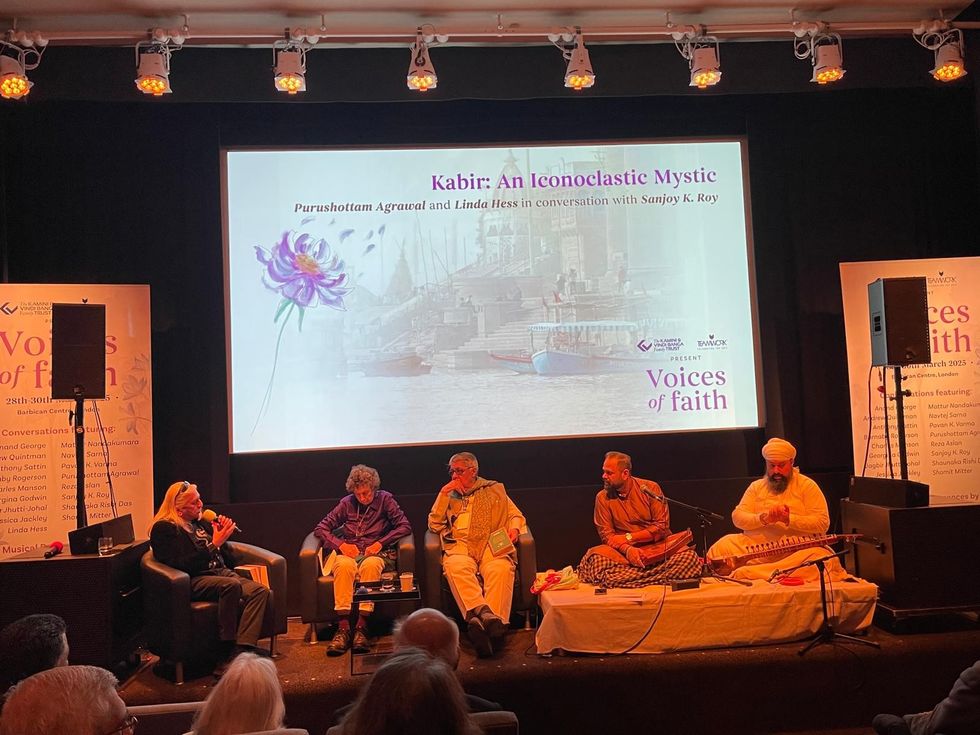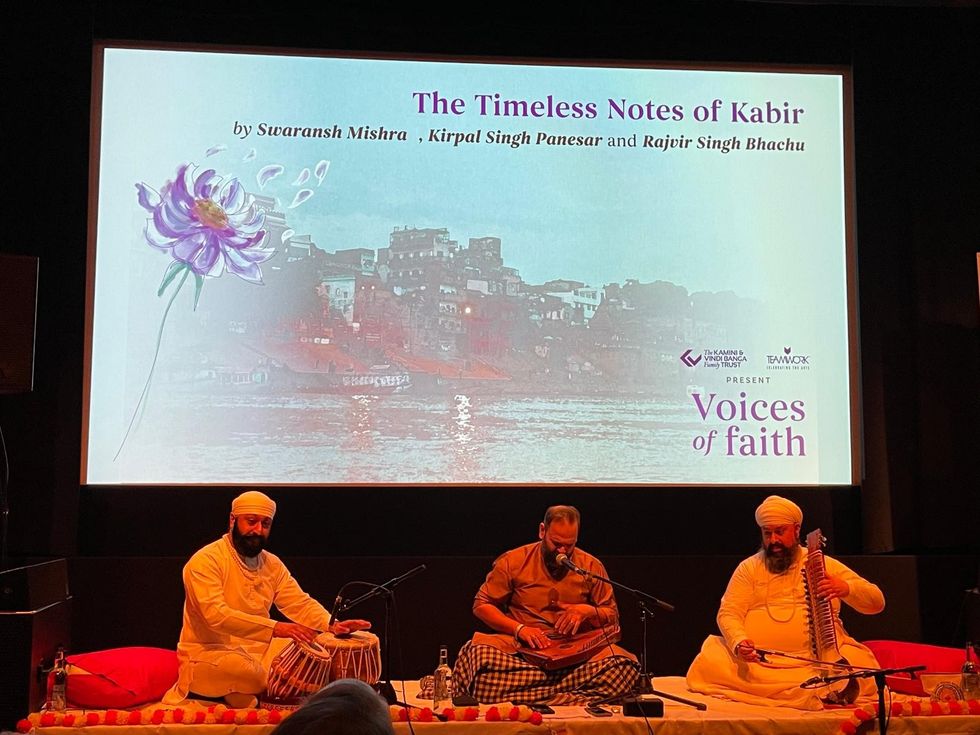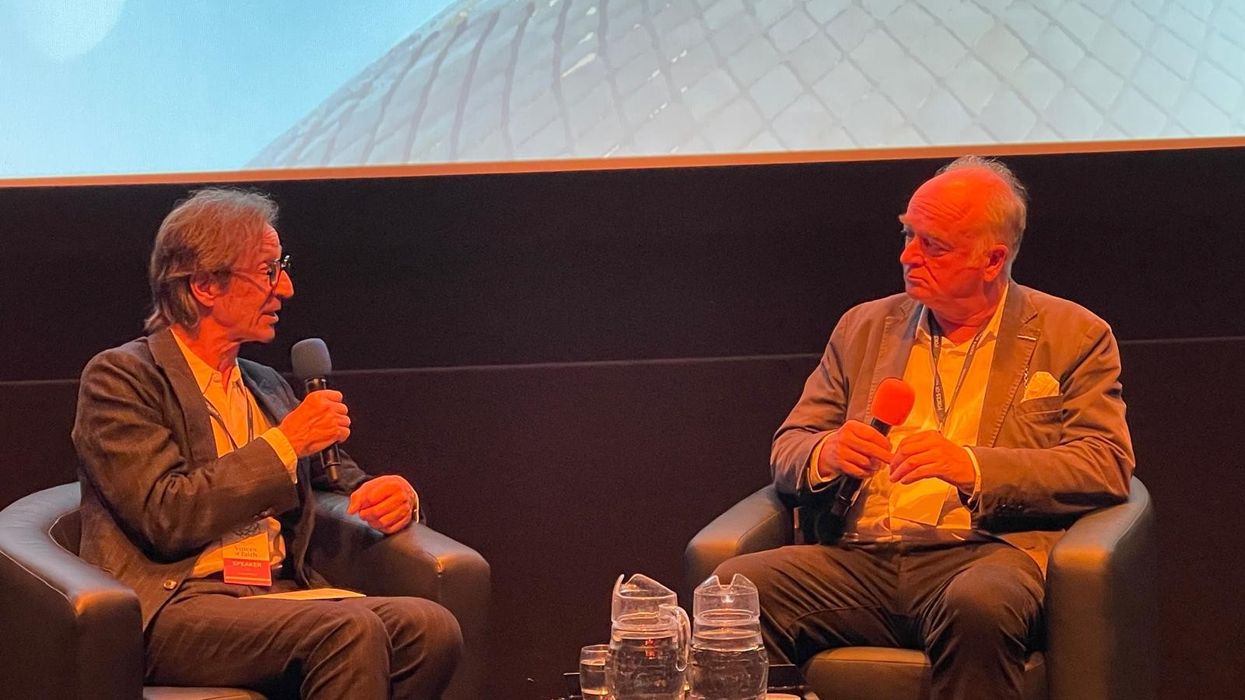The second day of Voices of Faith unfolded with an enchanting blend of music, philosophy, and intellectual exploration at the Barbican Centre, London. This inaugural festival, curated by Teamwork Arts—the force behind the Jaipur Literature Festival (JLF) and JLF London—has been made possible by the Kamini and Vindi Banga Family Trust, with the support of Tech Mahindra. Eastern Eye and Garavi Gujarat serve as the official media partners, amplifying the festival’s reach and resonance.
Session 1- Echoes of eternity: The timeless notes of Kabir
As dusk settled over London, the audience was drawn into a spellbinding musical journey—'The Timeless Notes of Kabir'. Swaransh Mishra, a sixth-generation exponent of the Banaras Gharana, led the performance, accompanied by the masterful Kirpal Singh Panesar on the dilruba and the gifted Rajvir Singh Bhachu on tabla. Their rendition of Kabir’s verses, infused with soul-stirring melodies, evoked a sense of transcendence, setting the stage for the evening’s deeper philosophical discussions.
Session 2- Decoding the mystic: Kabir in conversation
Following the mesmerising musical session, the intellectual heart of the evening began with the panel discussion 'Kabir: An Iconoclastic Mystic', featuring celebrated scholars Purushottam Agrawal and Linda Hess in conversation with Sanjoy K Roy. The discussion was an immersive exploration of Kabir’s literary and spiritual legacy, his defiance of orthodoxy, and his relevance in contemporary times.
Roy initiated the dialogue with a question to Agrawal: “Was Kabir a saint, a poet, or a philosopher? Was he even literate?”
Agrawal’s response was both deeply personal and academically profound. “I came to Kabir because of perpetual restlessness—anxiety, curiosity, and anger,” he reflected, recounting his childhood belief that he had been a sadhu in a past life. He traced his academic journey with Kabir back to 1977, highlighting how the mystic’s teachings continue to challenge societal constructs and resist the commodification of spirituality. “Kabir is everything you described. He is a poet, a philosopher, and a divinity in many eyes. But first and foremost, he is an anguished human soul. His words resonate with us today because his anxiety was not just spiritual—it was deeply social.”
The conversation delved into Kabir’s radical opposition to organised religion. Linda Hess recited some of his most incendiary verses. Hess explained, “Kabir understood the paradox of religion—it could be both a source of enlightenment and a vehicle for oppression. He saw beyond divisions and sought a deeper truth.” She emphasised the poet’s defiance of religious dogma, his criticism of empty ritualism, and his advocacy for inner purity over outward displays of faith.
The search for liberation: A dialogue on moksha
Addressing the concept of moksha, Agrawal dismantled conventional interpretations. “If at all there is something called moksha, it must be experienced in every moment of one’s life. Liberation is not a singular, transcendental event; it is a lived reality.”
Linda quoted Kabir’s most renowned song 'Jhini Chadariya'—a metaphor for the soul’s purity—and its message that even sages and seers have failed to keep their ‘chadar’ clean.
Sanjoy Roy then steered the discussion toward Kabir’s poetic style. “Why is his poetry often perceived as crude, yet so powerful?”
Agrawal responded, “Kabir’s words are raw, unfiltered, and unafraid. He exposes hypocrisy without mincing words. His power lies in his directness.” Hess added, “His poetry is not just literature—it is a living, breathing tradition, evolving through centuries.”
A legacy that transcends time
As the discussion drew to a close, the audience was left with a renewed understanding of Kabir—not just as a historical figure, but as a voice that continues to challenge and inspire across generations. The evening’s sessions at Voices of Faith were more than intellectual engagements; they were an invitation to introspection, urging participants to seek their own truths beyond inherited belief systems.

Session 3- The birth of a faith: Barnaby Rogerson in conversation with Anthony Sattin
The second day of Voices of Faith witnessed an intellectually enriching session featuring acclaimed British author, publisher, and historian Barnaby Rogerson in conversation with renowned journalist and travel writer Anthony Sattin. Their discussion, titled 'The Birth of a Faith', explored the historical and socio-political environment into which the Prophet Muhammad was born and the profound impact of his revelations on the Arabian Peninsula.
A glimpse into 7th century Arabia
Sattin opened the discussion by highlighting the significance of understanding the world in which the Prophet Muhammad was born, urging Rogerson to sketch out the historical landscape of early 600s Arabia. Rogerson, known for his extensive work on the Muslim world, took the audience on a journey back in time, drawing parallels between major historical events of the era, such as the construction of the Hagia Sophia under Emperor Justinian, and the birth of the Prophet in Mecca.
Mecca and Medina: The evolution of revelation
The discussion then shifted towards the two distinct phases of the Prophet’s life – Mecca and Medina. Rogerson emphasised that the early Meccan revelations were short, urgent, and focused on the Day of Judgment and God’s mercy, while the later Medinan revelations were longer and structured around the governance and self-regulation of the growing Muslim community.
Sattin noted the significance of these revelations and their transformative power, asking Rogerson to elaborate on how the Prophet not only attracted followers but also managed to unify the Arab tribes under a singular vision of faith.
The Prophet’s leadership and the Medina constitution
Rogerson spoke at length about the Prophet’s migration (Hijrah) to Medina, where he was initially welcomed not as a political leader but as an arbitrator of disputes. He explained that the Constitution of Medina, a groundbreaking agreement, played a crucial role in shaping the early Islamic society by defining the rights and responsibilities of different communities living in the city.
“In Medina, the Prophet was given a constrained platform of responsibilities. What truly unified people was the sound of the Qur’an,” Rogerson said. He highlighted how the oral tradition of recitation played a key role in spreading the message, drawing comparisons to historical figures such as Saint Paul in Christian tradition.

Faith, warfare, and the unification of Arabia
The conversation then explored the Prophet’s role as a leader in battle, a subject often overlooked in Western narratives. Rogerson candidly described how the Prophet strategically led military expeditions not out of bloodlust but to challenge the dominant Quraysh aristocracy of Mecca. He referenced Ibn Khaldun’s concept of Asabiyyah – group solidarity – to explain how the Prophet's charisma and spiritual leadership inspired a sense of unity among the tribes, allowing them to achieve what once seemed impossible.
Sattin and Rogerson also touched upon the chivalric traditions of pre-Islamic Arabia, reinforcing the idea that the Prophet’s leadership was deeply rooted in ethical conduct, mutual respect, and the protection of the vulnerable.
A sound, not just a text
One of the most captivating moments of the discussion came when Rogerson stressed that the Qur’an is not merely a written text but a living sound. “It is the sound of the Qur’an that did the magic,” he stated, explaining how oral recitation has been central to the faith from its inception.
As the session concluded, the audience was left with a profound appreciation of the historical and spiritual journey of Islam’s early days. Sattin’s thoughtful inquiries and Rogerson’s eloquent storytelling made The Birth of a Faith an unmissable highlight of Voices of Faith.




